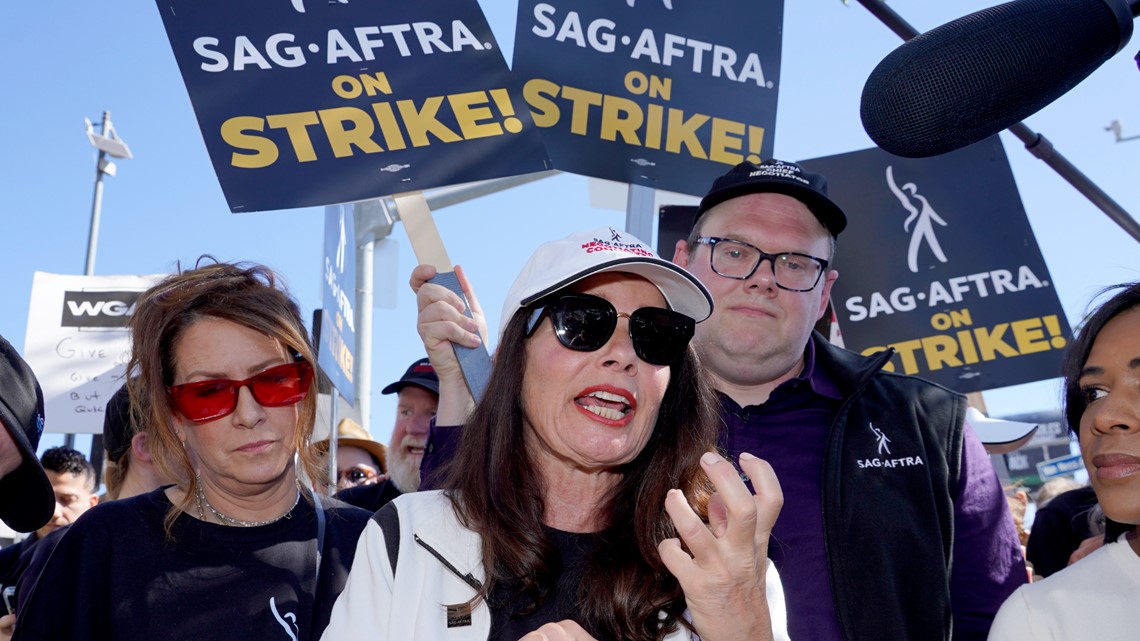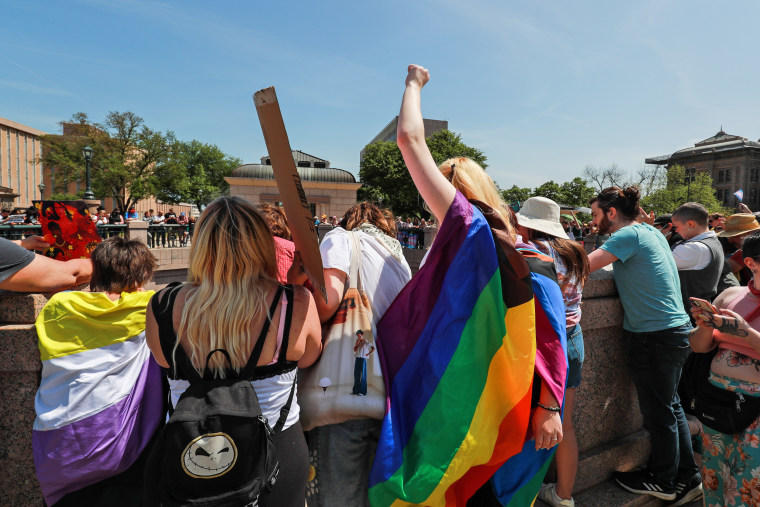SAG-AFTRA reaches deal with studios to end strike

The longest actors strike against film and TV studios in Hollywood history is set to end Thursday at 12:01 a.m.
LOS ANGELES — Hollywood’s actors union reached a tentative deal with studios Wednesday to end its strike, ending months of labor strife that ground the film and television industries to a historic halt.
The three-year contract agreement must be approved by votes from the union’s board and its members in the coming days, but the leadership declared that the strike will end at 12:01 a.m. on Thursday.
At nearly four months, it was by far the longest strike ever for film and television actors.
More than 60,000 members of the Screen Actors Guild-American Federation of Television and Radio Performers went on strike July 14, joining screenwriters who had walked off the job more than two months earlier. It was the first time the two unions had been on strike together since 1960. Studios chose to negotiate with the writers first, striking a deal that their leadership marked as a major win and bringing their strike to an end on Sept. 26.
The terms of the agreement were not immediately released. SAG-AFTRA said details would be made public after a meeting on Friday where board members review the contract. Issues on the table included both short-term compensation and future royalty payments for film and TV performances, along with control over actors’ images and likenesses regenerated with artificial intelligence.
“This tentative agreement represents a new paradigm. It gives SAG-AFTRA the biggest contract-on-contract gains in the history of the union, including the largest increase in minimum wages in the last forty years; a brand new residual for streaming programs; extensive consent and compensation protections in the use of artificial intelligence; and sizable contract increases on items across the board,” the Alliance of Motion Picture and Television Producers said in a statement Wednesday evening. The organization, which negotiates on behalf of major studios and streaming companies, said it “looks forward to the industry resuming the work of telling great stories.”
Executives from top entertainment companies including Disney, Netflix, Warner Bros. Discovery and Universal had a direct hand in negotiations.
The Writers Guild of America applauded Wednesday’s deal. “We’re thrilled to see SAG-AFTRA members win a contract that creates new protections for performers and gives them a greater share of the immense value they create,” the union said in a statement. “When workers are united, they win!”
Although the writers strike had immediate, visible effects for viewers, including the months-long suspension of late-night talk shows and “ Saturday Night Live,” the impact of the actors’ absence was not as immediately apparent. But its ripple effects — delayed release dates and waits for new show seasons — could be felt for months or even years.
Actors should quickly return to movie sets where productions were paused, including “Deadpool 3,” “Gladiator 2” and “Wicked.” Other movies and shows will restart shooting once returning writers finish scripts.
And beyond scripted productions, the end of the strike allows actors to return to red carpets, talk shows and podcasts, as Hollywood’s awards season approaches.
“The SAG strike is over!! I can finally say it: watch my documentary Saturday night at 8 on HBO/MAX!” actor-director Albert Brooks said on social media moments after the strike ended. “Couldn’t say a word until now!!”
The only major awards show directly effected by the strike was the Emmys, which was moved from September to January. Now, the usual fall Oscar campaigns will mobilize.
But any feeling of industry normalcy could prove temporary. The circumstances that brought on the strikes — the shift from traditional theatrical and broadcast media to streaming, and emerging tech like AI — have not been slowed. And the gains made by the strikes may embolden other Hollywood unions, or these same guilds in negotiations that will come up again in just a few years.
Union leaders treated the strike like a watershed moment from the start, coming as it did amid wider labor fights in other industries.
“I think it’s a conversation now about the culture of big business, and how it treats everybody up and down the ladder in the name of profit,” SAG-AFTRA President and “The Nanny” star Fran Drescher told The Associated Press in an August interview.
Duncan Crabtree-Ireland, the executive director and chief negotiator who led the team that struck the deal for the guild, told the AP in August that he was “honored to be part of making sure that our members get a fair contract that’s going to protect them going into the future and make sure that the 14-year-olds I talked to on the Disney picket line still have the ability to be an actor when they turn 18.”
The agreement also means a return to sets for thousands of film crew members who have left with nothing to work on during the strikes. SAG-AFTRA sought to offset their hardship by allowing sometimes controversial interim agreements for some smaller productions to proceed, and by making their strike relief fund available to all workers in the industry.
https://www.wfaa.com/article/news/nation-world/sag-aftra-actors-strike-studios-reach-deal/507-77e9b3e1-0c1f-40ef-a97f-4f6a8ee468a3 SAG-AFTRA reaches deal with studios to end strike



